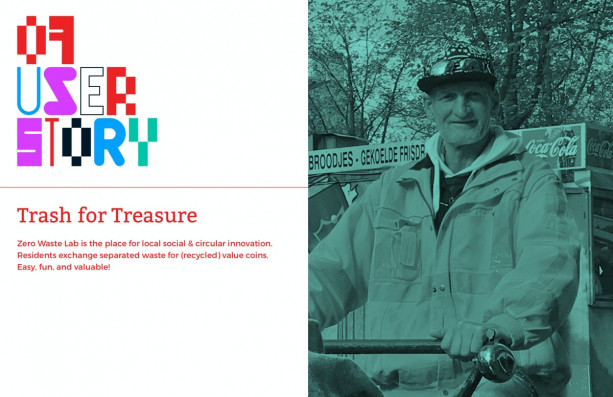Stay in the know on all smart updates of your favorite topics.
52 weken duurzaam, we gaan het gewoon doen.
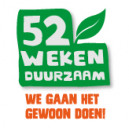
52wekenduurzaam nodigt je uit om je eigen leven stap voor stap duurzamer te maken. Een jaar lang iedere week een kleine verrassende en duurzame stap. Om te zien of het bij je past. Word je er gelukkig van, dan hou je het vol. Zo niet, dan skip je het. Wij onderzoeken wat er wel kan. Uitdagend, leuk, leerzaam en gratis. Loop je een stukje met ons mee?
Wij denken dat we met elkaar op een gemakkelijke manier veel duurzamer kunnen worden. Door elkaar te inspireren en uit te dagen. Door leuke en verrassende dingen te onderzoeken. Om zo je eigen versie van een duurzame leefstijl te ontwikkelen. We streven naar 5000 deelnemers in 2021. Hoe meer mensen meedoen, hoe beter. Voor onze Totale Impact Score, maar ook voor jezelf, want samen is veel leuker dan alleen. Dus geweldig als je nu al je gezin, je buren, vrienden en collega’s inspireert om ook mee te doen.
Communication Alliance for a Circular Region (CACR)

De taskforce Communication Alliance for a Circular Region (CACR) wil de circulaire economie in de Metropoolregio Amsterdam versnellen met praktische verhalen voor en over ondernemers en bedrijven. We nodigen iedereen uit mee te doen met de discussie op amsterdamsmartcity.com. De CACR bestaat uit: Hogeschool van Amsterdam | Gemeente Amsterdam | Amsterdam Economic Board | Amsterdam Smart City | Metabolic en AMS Institute.
Artikelen 'Circulaire economie en data'
• Volop kansen in de nieuwe circulaire werkelijkheid / Data zijn de zuurstof van de circulaire economie: deel 1
• Slim datagebruik in de circulaire economie: de drie belangrijkste redenen / Data zijn de zuurstof van de circulaire economie: deel 2
• 100.000 bedrijven restafvalvrij in 2025
• Slim datagebruik in de circulaire economie: dit is wat bedrijven zelf kunnen doen / Data zijn de zuurstof van de circulaire economie: deel 3
Artikelen circular strategies
Maak je bedrijf toekomstbestendig met deze circulaire strategieën
--------------------------------------------------------------------------------
The taskforce Communication Alliance for a Circular Region (CACR) is working to accelerate the circular economy in the Amsterdam Metropolitan Area, sharing practical stories for and about entrepreneurs and businesses. The CACR is an initiative by Amsterdam University of Applied Sciences | City of Amsterdam | Amsterdam Economic Board | Amsterdam Smart City | Metabolic | AMS Institute.
Articles 'Circular economy and data'
• A wealth of opportunities in the new circular reality / Data is the oxygen that the circular economy thrives on: part 1
• Smart data usage in the circular economy: 3 key reasons / Data is the oxygen that the circular economy thrives on: part 2
• 100,000 companies residual waste-free by 2025
• Smart data use in the circular economy: this is what companies can do themselves / Data is the oxygen that the circular economy thrives on: part 3
Articles: Future-proof your business using circular strategies
Wicked Problems
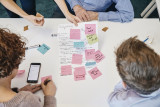
Te wicked? Niet voor ons.
Wij werken allemaal aan urgente, complexe, maatschappelijke uitdagingen. Issues die schier onoplosbaar lijken, van dilemma’s en paradoxen omgeven, nog niet duidelijk hoe het moet. Wel is duidelijk dát het moet, dat we elkaar nodig
hebben en dat we er NU aan moeten beginnen. Om met de woorden van Jan Rotmans te spreken; we leven niet in een tijdperk van verandering maar in een verandering van tijdperk. En hier hoort een nieuwe gereedschapskist bij.
En of je nou aan energietransitie werkt, andere mobiliteitssystemen, creëren van waterstofhubs, peer to peer autodeelsystemen, het maakt niet uit, we zien dat al deze opgaven op enig moment tegen gelijksoortige barrières aanlopen. Op samenwerking, financiering, privacy, onvoldoende aansluiting op de maatschappij, om maar een paar voorbeelden te noemen.
Unieke samenwerking
Als Amsterdam Smart City netwerk willen en kunnen we deze opgaven niet laten liggen. Door het bundelen van onze kennis en expertise kunnen we als netwerk iets unieks bieden en de wil en durf tonen om deze barrières te doorbreken. De betrokken partners die dit uitdenken en begeleiden zijn RHDHV, Kennisland, Drift, NEMO, Arcadis, Alliander, HvA en Metabolic. Zij bundelen hun expertise en ervaring om de echte vragen boven tafel te krijgen, tot nieuwe manieren van samenwerken te komen en barrières te doorbreken. We richten ons met name op de start van de samenwerking. Gezamenlijk ontwikkelen we een ‘wicked problem aanpak’. Op een nieuwe manier, lerend door te doen, exploratief.
Waar moet je aan denken?
Wat is eigenlijk het echte probleem? Wiens probleem is dit? Hoe kijken anderen er tegenaan? Welke andere partijen lijken nodig? Hoe vind je ze? Hoe ga je om met eigenaarschap en botsende frames? Hoe zorg je dat je al in
een vroeg stadium de maatschappij (bewoners, ondernemers, werknemers, etc) betrekt en hun ervaringen in het project trekt? Het wicked problem team zet nieuwe methoden in voor het beantwoorden van deze vragen. En het creëren van de benodigde commitment om het vraagstuk aan te pakken. Niets staat van te voren vast, want we passen ons aan aan wat we tegenkomen. Met elkaar ontwikkelen we een nieuwe aanpak om de barrières te doorbreken.
Upcyclecentrum Almere

In the Upcyclecentrum we make the circular economy and the upcycle process visible and tangible. We don’t do this alone. Our residents provide us with raw materials by properly separating their waste, the entrepreneurs (startups) upcycle these raw materials into new products and inspiring workshops are organized in our circular designed experience center. Waste = raw material in the circular economy; this is the central theme of all our activities.
Follow us on instagram on www.instagram.com/upcyclecentrum
#upcyclecentrum
3-CYCLE
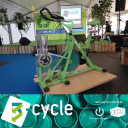
We are 3-CYCLE, a new upcycling project by Erik Fakkeldij (The Botfactory) and Joost Bosker (Oerz). We joint forces in 2019 to create new products from used pieces of plastics and metal. And... to make this a true dutch innovation, we use a setup with a bike to do the first steps of the upcycling process!
But that's not all... we do this by giving workshops and presentations to kids and the public to create more awareness. Our aim is to show that waste is not only bad for the environment, but it also means missed opportunities for reusing the waste and upcycling it into new products.
We believe this type of education is key for engaging the public, while making a
difference at the same time.
Amsterdam Biochar Initiative

Biochar is a soil amendment made typically from bio-mass through a process called pyrolysis with low-oxygen. By using a low-cost, easy-to-make biochar stove, communities can arrange to turn common waste products into biochar.
The vision behind this project is for healthy and resilient communities. This means that I prefer methods that promote local, DIY and community approach, so that it can quickly scale and adapt to different towns/cities.
Most importantly, carbon being the element behind Life has tremendous versatility. It can be used to filter water and then used as a soil amendment. Or it can be mixed to make better concrete composites for roads (asphalt) and concrete. It can improve manufacturing by making carbon fiber alloys.
Last but not least, it is done through a circular model of using waste such as wood sticks, bio-mass, paper, saw dust mills, anything with carbon, even plastics. The output heat can be captured for heating buildings and cooking stoves. The opportunities are endless.
Sizes of stove vary in function of available supply/demand dynamics. For more information, check the biochar-international.org or Ithaka International.
Thank you.
PS: Stockholm, Sweden has achieved this recently. If the Swedes can do it, we can learn from them and improve together!
http://www.nordregio.org/sustainable_cities/stockholm-biochar-project/
Some guidelines for background and context
https://www.biochar-international.org/wp-content/uploads/2018/04/IBI_Pyrolysis_Plant_Guidelines.pdf
Take Away (and delivery) Without Throwing Away

We've just launched the delivery pilot for Ozarka: a prepared foods service coming to Amsterdam where all our packaging is sustainable alternatives to single-use plastic and all of it is returnable and reusable. We're accepting new participants for both residential and corporate customers in Amsterdam. Email me to join or find out more! beth@ozarka.biz
Circular Expo

A temporary exposition from 9 till 27 October in the Herstelling at the Town Hall to provide practitioners of circular projects in the city and the municipality Amsterdam a place to show their work and take the spotlight. Learn what a circular economy is and how the whole city is working on becoming and staying circular.
Opening 9 October
End 27 October
Special program follows later
Do you have an innovative circular product or project and want to show it at the circulair expo? Contact Ward Mesman at w.mesman@amsterdam.nl
The Great Bubble Barrier
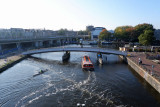
Every year, more than 8 million tons of plastic pollution ends up in our oceans of which 60-80% originates from rivers. Plastic does not biodegrade and causes great harm to the environment. Marine life gets entangled in plastics, vessels get damaged and microplastics form a health hazard for the smallest to the largest organisms. The Great Bubble Barrier has developed a technology which can intercept plastic pollution in rivers before it reaches the ocean: the Bubble Barrier, a bubble curtain with a catchment system.
The first long-term Bubble Barrier in the world was placed in November 2019 at Westerdok in Amsterdam.
Watch the video of Bubble Barrier Amsterdam.
THE BUBBLE BARRIER SYSTEM: HOW DOES IT WORK?
The bubble curtain is created by pumping air through a perforated tube on the bottom of the waterway. We make use of the natural flow of the river. The plastic waste will be directed to the side and into our catchment system at the riverbank, where it will be retained and removed from the water.
- It does not hinder ship traffic
- It covers the full width and depth of the waterway
- It allows fish to pass
Visit the Bubble Barrier Amsterdam at Westerdoksplein.
Will the next Bubble Barrier be in your river or city? Send The Great Bubble Barrier a message!
Join the $1 million #CircularDesign Challenge

Organizations involved
THE NEW PLASTICS ECONOMY INITIATIVE
The New Plastics Economy is an ambitious, three-year initiative to build momentum towards a plastics system that works. Applying the principles of the circular economy, it brings together key stakeholders to rethink and redesign the future of plastics, starting with packaging. The initiative is led by the Ellen MacArthur Foundation in collaboration with a broad group of leading companies, cities, philanthropists, policymakers, academics, students, NGOs, and citizens.
The initiative is supported by Wendy Schmidt as Lead Philanthropic Partner, and MAVA Foundation, Oak Foundation, and players of People’s Postcode Lottery (GB) as Philanthropic Funders. Amcor, The Coca-Cola Company, Danone, MARS, Novamont, PepsiCo, Unilever, and Veolia are the initiative’s Core Partners.
ELLEN MACARTHUR FOUNDATION
The Ellen MacArthur Foundation was created in 2010 to accelerate the transition to a circular economy. The Foundation works across five areas: insight and analysis, business and government, education and training, systemic initiatives, and communication. With its Knowledge Partners (Arup, IDEO, McKinsey & Co., and SYSTEMIQ), and supported by Core Philanthropic Funder (SUN), the Foundation works to quantify the economic opportunity of a circular model and to develop approaches for capturing its value. The Foundation collaborates with its Global Partners (Danone, Google, H&M, Intesa Sanpaolo, NIKE, Inc., Philips, Renault, Unilever), and its CE100 network (businesses, universities, emerging innovators, governments, cities and affiliate organisations), to build capacity, explore collaboration opportunities and to develop circular business initiatives. By establishing platforms such as the New Plastics Economy initiative, the Foundation works to transform key material flows, applying a global, cross-sectoral, cross value chain approach that aims to effect systems change.
www.ellenmacarthurfoundation.org | @circulareconomy
INTERNATIONAL SUSTAINABILITY UNIT
The Prince of Wales's International Sustainability Unit (ISU) was formed in 2010 to address critical challenges to development and the environment. The ISU builds on the success of The Prince’s Rainforests Project, established to help find a solution to tropical deforestation. With an international reputation for neutral convening, underpinned by rigorous analysis, the ISU engages key actors from Governments, the private sector, research communities and civil society to catalyze positive change across the global sustainability agenda.
The ISU's Marine Programme focuses on the global transition to a sustainable Blue Economy. The core components of this work include fish stock recovery, coral reef health and marine plastic pollution. During the last six years the ISU has brought together stakeholders from all sectors to accelerate solutions to some of the most pressing ocean-related challenges and build consensus on solutions for and a pathway towards a sustainable Blue Economy.
WENDY SCHMIDT
Wendy Schmidt is President of The Schmidt Family Foundation, where she works to advance the development of renewable energy and the wiser use of natural resources. The Foundation houses its grant-making operation in The 11th Hour Project, which supports more than 150 non-profit organizations around the world in program areas including renewable energy, ecological agriculture, human rights, and our maritime connection through its 11th Hour Racing program. In 2009, Wendy Schmidt and her husband, Eric Schmidt, created the Schmidt Ocean Institute (SOI), and in 2012 launched the research vessel, Falkor, as a mobile platform to advance ocean exploration, discovery, and knowledge, and catalyze the sharing of information about the oceans. Since 2012, Falkor has hosted more than 500 scientists from 27 countries.
To further her commitment to ocean issues, in 2010 Wendy Schmidt partnered with XPRIZE, following the Deepwater Horizon disaster, to sponsor the Wendy Schmidt Oil Cleanup XCHALLENGE, a $1.4 million competition designed to identify efficient and innovative solutions to clean up surface oil spills. Wendy Schmidt once again partnered with XPRIZE in 2012 to design the Wendy Schmidt Ocean Health XPRIZE, a $2 million purse, awarded in July, 2015, where competitors responded to the global need for accurate and available sensors to more broadly measure the signs of ocean acidification, one of the harbingers of climate change.
Wendy Schmidt is the Lead Philanthropic Partner of the New Plastics Economy Initiative, which is led by the Ellen MacArthur Foundation. Wendy earned an M.J. in Journalism from The University of California at Berkeley, and a B.A. magna cum laude from Smith College.
Follow Wendy on Twitter: @wenschmidt
Ozarka - Amsterdam's first #NoSUPP Grocery Store
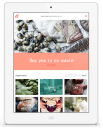
Offering a disruptive grocery-shopping model that reduces packaging waste dramatically, without sacrificing convenience.
Opening in Amsterdam in Spring, 2018: Ozarka is a new-concept shop offering upmarket, gorgeous, high-quality yet affordable specialty foods, every-day grocery, and personal care products. We will also feature a prepared foods station and salad bar that is self-serve and sold by weight.
Best of all, Ozarka is a #NoSupp* retailer. We will sell no product wrapped or packaged in single-use plastic. We will make it incredibly enjoyable *and* convenient for our customers to participate in sustainable shopping.
Plastic packaging has created one of the most severe environmental crises of our time. We use far more of it that we can recycle or manage and most of it ends up in landfill, or polluting our oceans and terrestrial environment (only 8% of plastic is recycled worldwide).
Ozarka's model aims to drastically reduce and remove plastic from our daily lives without compromising quality or convenience in every day shopping. Our food is beautiful. Our shopping experience is beautiful. With our customers we will keep the planet beautiful.
Say yes to Ozarka. Say yes to #NoSUPP
We are inviting suppliers to contact us and join in this vision. Specifically:
Fruit and vegetable producers
Local cheese makers
Local beter-leven dairy
Caterers and gourmet food truck vendors
High end personal product makers looking to prototype a refills model: soaps, shampoos, conditioners (think Kiehls, Body Shop, Kevin Murphy)
Bio-based, single-use packaging manufacturers
Compostable packaging manufacturers
Industrial composting facilities
*NoSUPP = No Single Use Plastic Packaging
Circular waste bags

Do you realize that most plastics bags and containers used to collect waste are actually still made from virgin plastics..... That is why GreenWavePlastics and Amsterdam based CitiesFoundation have introduced a 100% recyclate content waste bag for the WASTED program in Amsterdam Noord. All produced in The Netherlands Who is next ??
Email : greenwaveplastics@live.nl
3D printing with local residual products (plastic waste)
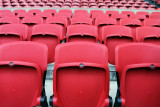
Extra information
The Amsterdam ArenA (one of the most sustainable stadiums in the world) replaces in the run-up to the Euro 2020 all stadium seats and would like to do so in a socially responsible way.
It involves approximately 48,000 hard plastic chairs on metal frames and 4 to 5,000 more luxurious upholstered chairs of corporate boxes and grandstands. Along with Better Future Factory, an innovation and design firm specializing in recycling of plastic waste flows, the HvA will examine with the ArenA in what way the seats can be reused preserving the highest value as possible.
Amsterdam ArenA and HvA will explore one of the scenarios in collaboration with 3D4Makers, a company that works with (recycled) plastic filament for printers using Fused Deposition Modelling. The question is how the material of the stadium seats behaves with these processing techniques considering the impurity of the material.
In addition, this project investigates the technical and aesthetic properties of the processed material in order to determine what can be made for this type of products.
First Zero Waste Lab in Netherlands

The Zero Waste Lab is an initiaitive of De Gezonde Stad (the Healthy City) and is supported by partners Stadsdeel Oost, Icova, Cities Foundation, de Regenboog Groep, Ymere and EY.
Besides, the Dapper Market, local entrepreneurs, the Dapper School and residents join.
Smart Stories
Check the article about the Zero Waste Lab featured in our online magazine 'Smart Stories':
The Bio-based street bench : A sustainable cooperation between Waternet and NPSP

Using a biocomposite to make street benches
Scan for opportunities repair and recycling industry

Since repairing is better than disposing
If you want to receive the dutch report, please send me a message.
RECURF
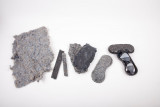
RECURF focuses on the possibilities to process the new material combinations of bio-based plastics and textile residues in attractive circular products for interior and exterior uses
De Ceuvel

De Ceuvel is one of the most sustainable and unique urban developments in Europe.
Stay up to date
Get notified about new updates, opportunities or events that match your interests.
